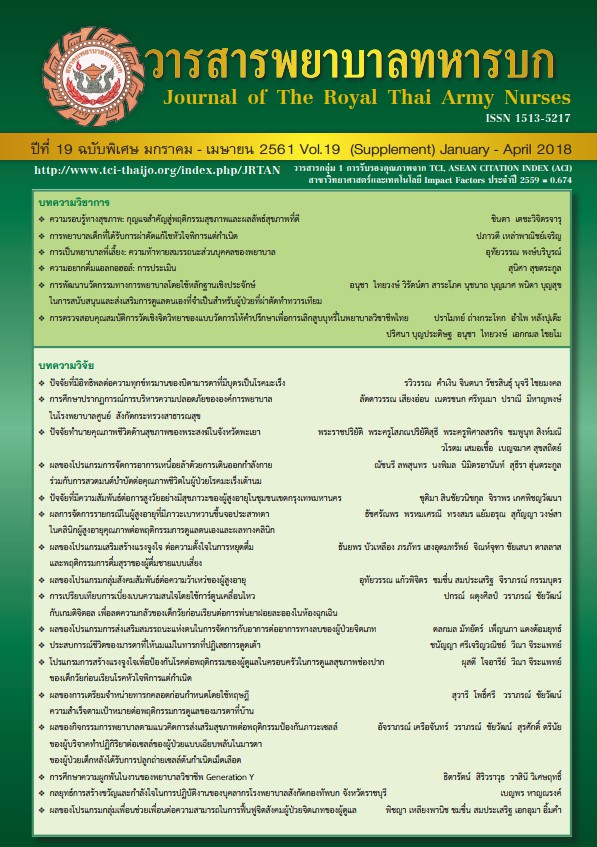He Protective Factors Influence On Psychological Well-Being Among Aging People
Keywords:
Psychological well-being, Aging peopleAbstract
Psychological well-being is an important factor to promote quality of life in older adults. The purpose of this study was to determine factors influencing psychological well-being among older adults. Multi-stage random sampling was used to recruit the samples. There included 108 older adults in Bang Pakong District, Chachoengsao Province. Research instruments consisted of a Personal information record, Instrumental activities of daily living questionnaire, Adherence and religious practices questionnaire, Optimism questionnaire,
Resilience questionnaire and Psychological well-being questionnaire Cronbach’s alpha reliabilities: .911, .989, .900, .982 and .946 respectively. Data were analyzed by using descriptive statistics, Pearson’s correlation coefficients and Stepwise multiple regression analysis. The study findings showed that the sample’s mean score of psychological well-being was in high level (M = 56.94, SD = 6.40). The predictable variables included optimism and resilience (β = .630, .334, p < .001 respectively). These two significant factors accounted for 71.6% (R2 = .716, Adjusted R2 = .711, F = 132.410, p < .05) of the variance in explanation of psychological well-being. These finding clearly indicated that optimism and resilience have influenced on psychological well-being. Therefore nurse should concern about promoting these factors in order to promote psychological well-being in older adults.
Downloads
References
2. National Statistical Office. Elderly in Thailand survey 2014. Bangkok: Text-and-journalpublication-co-ltd; 2014. (in Thai).
3. Ryff, C. D., & Keyes, C. L. M. The structure of psychological well-being revisited. Journal of Personality and Social Psychology 1995; 69: 719-727.
4. Wongpanarak, N. Depression: A Significant Mental Health Problem of Elderly. Journal of The Royal Thai Army Nurses 2014; 15: 24-31. (in Thai).
5. Mongkol, A. et al. Study of Thai Happiness Indicators. Journal of the Psychiatric Association of Thailand 2001; 209-225. (in Thai).
6. Black, J. M., & Hawks, J. H. Medical-Surgical Nursing: Clinical Management for Positive Outcomes. 7th ed. Singapore: Elsevier; 2008.
7. Department of Mental Health. 5 Happiness Dimensions for Elderly Guideline. 2nd ed. Bangkok: The Agricultural Cooperative Federation of Thailand. Limited; 2013.
8. Scheier, M. F., & Carver, C. S. Effects of optimism on psychological and physical well-being: Theoretical overview and empirical update. Cognitive Therapy and Research 1992; 16: 201-228.
9. Wagnild, G. M., & Young, H. M. Development and psychometric evaluation of the resilience scale. Journal of Nursing Measurement 1993; 1: 195-178.
10. Chachoengsao Provincial Public Health Office. (2560). Population data in 2016 classify by age and district area; 2017. (in Thai).
11. Tabachnick, B. G., and Fidell, L. S. Using multivariate statistics. 6th ed. Boston: Pearson; 2013.
12. Jitapankul, S. et al. Elderly analysis and geriatric medicine. Bangkok: Chulalongkorn University Printing House 1998. (in Thai).
13. Mahiphun, L. Factors Related to Spiritual Well-Being among Caregivers of Schizophrenic Patients [dissertation]. Chonburi: Burapha University; 2017. (in Thai).
14. Scheier, M. F., Carver, C. S., & Bridges, M. W. Distinguishing optimism from neuroticism: A revaluation of the Life Orientation Test. Journal of Personality and Social Psychology 1994; 67: 1063-1078.
15. Pechpak, W. Factors influencing well-being of order adults affected by the 2004 [dissertation]. Nakhonpathom: Mahidol University; 2007. (in Thai).
16. Wichitsiri, P. Wisdom, social support and psychological well-being of elderly in the elderly club at WatSarod Rat Burana District, Bangkok [dissertation]. Bangkok: Kasetsart University; 2012. (in Thai).
17. Chuasungnoen, N. Relationships between perceived health status, activity, family support and psychological well-being of elders in elderly clubs, Bangkok Metropolis [dissertation]. Bangkok: Chulalongkorn University; 2007. (in Thai).
18. Seligman, M. E. Learned optimism. New York: Simon and Schuster 1990.
19. Mahitthanupap, P. Optimism, Developmental Task performance and Psychological well-being of the elderly in Wang Nam Khiao district, Nakhon Ratchasima province. Journal f Social Sciences and Humanities (Thailand) 2012; 38: 166-178. (in Thai).
20. Yoichi, C., & Andrew, S. Positive psychological well-being and mortality: A quantitative review of prospective observational studies. Psychosomatic Medicine 2008; 70: 741-756.
21. Tomas, J. M., Sancho, P., Melendez, J. C., & Mayordomo, T. Resilience and coping as predictors of general well-being in the elderly: A structural equation modeling approach. Aging & Mental Health 2012; 16: 317-326.
22. Sagone, E., & De Caroli, M. E. Relationships between psychological well-being and resilience in middle and late adolescents. Social and Behavioral Sciences 2014; 141: 881-887.
Downloads
Published
How to Cite
Issue
Section
License
บทความหรือข้อคิดเห็นใดใดที่ปรากฏในวารสารพยาบาลทหารบกเป็นวรรณกรรมของผู้เขียน ซึ่งบรรณาธิการหรือสมาคมพยาบาลทหารบก ไม่จำเป็นต้องเห็นด้วย
บทความที่ได้รับการตีพิมพ์เป็นลิขสิทธิ์ของวารสารพยาบาลทหารบก
The ideas and opinions expressed in the Journal of The Royal Thai Army Nurses are those of the authors and not necessarily those
of the editor or Royal Thai Army Nurses Association.






